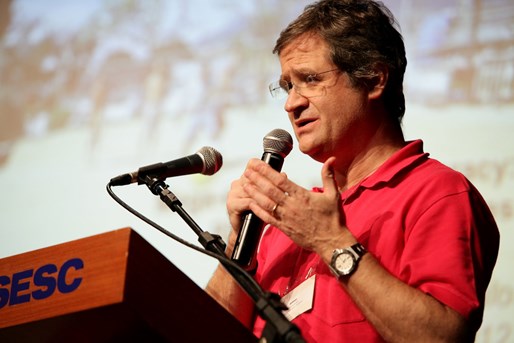Brazilians fight for transparency in games

Former member of the Brazilian Olympic Committee Alberto Murray speaking at the Play the Game day in Brazil. Photo (c) Roberto Assem
“If we continue this way, the World Cup and the Olympics will be the biggest corruption scandals in the history of our country!”
The lawyer and former member of the Brazilian Olympic Comittee, Alberto Murray Neto did not mince his words when debating the legacy of his country’s hosting of the two world’s most important sports events.
Or rather, as another speaker, the president of the Brazilian Paralympic Committee (CPB), Andrew Parsons, said in a correction to the organisers:
“I will have to chide you all: Brazil is going to host three, not two mega-events, because the Paralympic Games are coming as well.”
Andrew Parsons was the only sports confederation leader to accept an invitation from Play the Game to join a one-day seminar entitled “Mega-events and Democracy: Risks and Opportunities”.
And although many of the 85 speakers and participants expressed their concerns in a much less diplomatic language than Andrew Parsons, he let the audience hear between the lines that he found time was up for reform in Brazilian sport and in its Olympic Committee.
Parsons, who jumped from general secretary to president of the CPB three years, ago, ascribed the present success and positive climate inside the CPB to the reforms he had been spearheading - including setting a term limit of eight years for the CPB president:
“After making the things inside better, we now see the results”, he said.
While Parsons won respect from the audience by contributing to the debates, his colleagues in Brazilian sports leadership missed an opportunity to answer to the widespread concerns about how the country’s sport and the mega-events are administered.
Several speakers pointed to the corruption, the demolished neighbourhoods and displaced families that already today are results of hosting 2014 and 2016 events.
"The private companies that are to take over the Maracanã Stadium in Rio, are only asked to reimburse 18 percent of the public investment, so they can keep any profits from future operations," Juca Kfouri, journalist and a leading voice in Brazilian sports debate stated.
“No one is trustworthy”, he categorically said about the people who are organising the big events, alleging that embezzlement and money laundering will inevitably happen if it has not already started.
“There is no reason to believe that anything is going to be different from the scandal of the Pan American Games in Rio in 2007. But we should not let them sleep well.”
Another journalist, Erich Beting, marketing specialist and founder of the website “The Sports Machine” accused the government and sports movement of losing a big chance of branding the nation:
“The story we sold to the world to get the Rio Olympics in 2016 is one of the best planned campaigns made in Brazil. But until now the efforts have stopped with the planning,” Erich Beting said in his call for action.
“In the case of the World Cup 2014, there simply are no plans for the country or the event. We got the event by a sports political decision in FIFA, but what do we want to achieve with it?” he said.
City debt will delay public investment
The American urban planning expert Christopher Gaffney, a visiting professor at the University of Fluminense, went a step further in his criticism of the organization of the World Cup and Olympics.
"The government has through its development bank BNDES offered each of the 12 host cities to borrow 400 million Reales (ca. 200 million dollars) for the World Cup. At the same time, the government has given host cities permission to borrow as much money as the politicians want for infrastructure projects related to the World Cup."
"The debt they assume, will hit public investment in housing, public transport and education for many years ahead," he projected.
Christopher Gaffney also criticized that there is no transparency and public scrutiny of the public grants to the private companies in charge of constructing the sports facilities.
"If we have no transparency in the use of the funds, into who planned the stadiums, who signed construction contracts etcetera, then we are emptying the democratic institutions of their meaning," he claimed.
Index of transparency
One project in Brazil, Jogos Limpos (Clean Games) is currently addressing the 12 host cities with the aim of, inter alia, counteracting the risk of corruption in connection with the upcoming events.
Betina Sarue, who manages Jogos Limpos in her function as a coordinator of the Instituto Ethos, is in the process of collecting data from the host cities. She says:
"We want to create an index for transparency, integrity and social mobilization of citizens in the host cities."
The index will gather information about the municipal and state legislation, policy decisions, budget plans, and acquisition of materials, and it will monitor the construction contracts and the degree of citizen involvement.
Jogos Limpos is a networking initiative which involve several Brazilian institutions and NGO’s, supported by the global anti-corruption campaign launch by Siemens. After being caught red-handed in one of the world’s biggest corruption scandals in the corporate sector, Siemens has made a global turn-around, deciding to become a global leader in anti-corruption.
Peter Andreas Gölitz, compliance consultant in Siemens Brasil, told about this process that could inspire sport organisations on all levels. And professor Roberto Maluf de Mesquita from Uninove called for a joint creative process to develop new democratic structures and procedures in Brazilian sport.
According to Betina Sarue, such examples of new ways of networking may turn out to become an unexpected, but important legacy of the Brazilian mega-events.
Read more about the Play the Game day here
The article is based on reports by freelance journalist Camila Mattoso, São Paulo, and journalist Steen Bille, Danish Gymnastics and Sports Associations. Their articles have been edited and amended by Play the Game.





